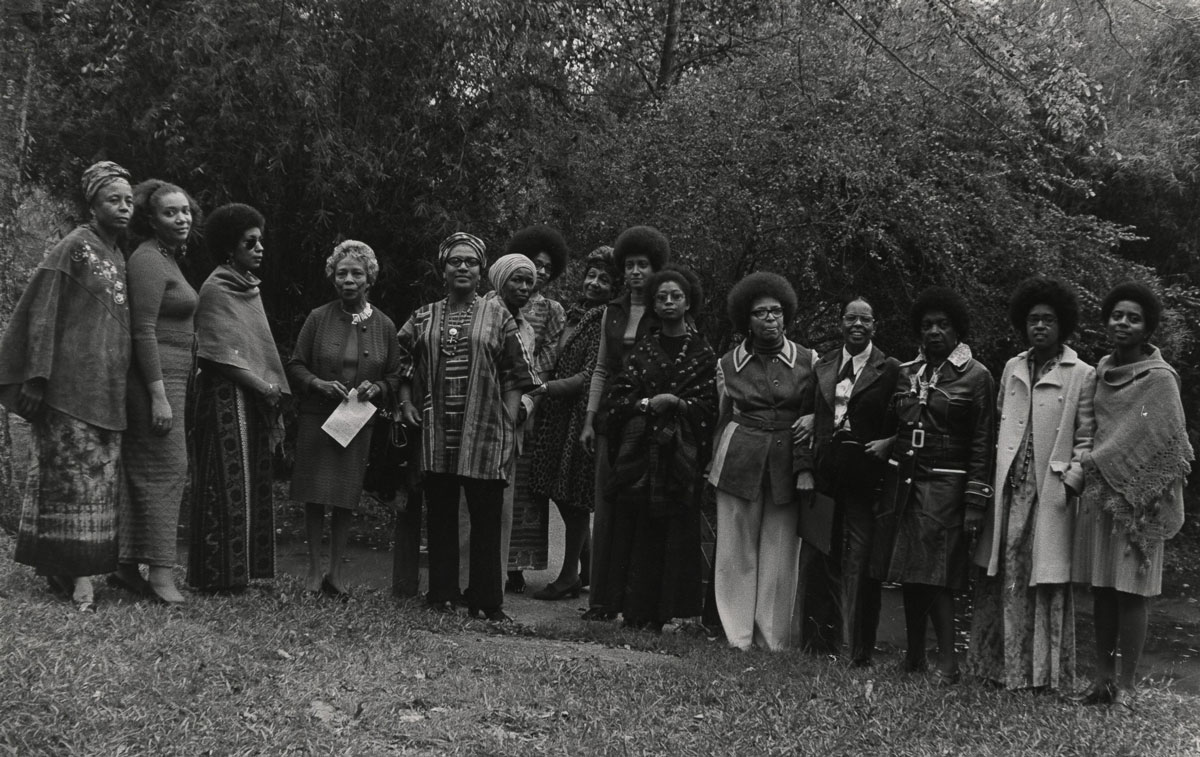Eve L. Ewing replied right away when Nikole Hannah-Jones contacted her to ask if she would contribute to “The 1619 Project.” With the request came a list of suggested historical topics, but one name jumped out at Ewing in particular about whom the author agreed to write: Phillis Wheatley. Wheatley was someone with whom she had felt a sort of kinship for various reasons. Wheatley was a poet; Ewing wrote poetry. Wheatley lived in Boston, and so did Ewing.
In conjunction with her line of work, Ewing decided to contribute a poem about Wheatley, one that took inspiration from her ties to Boston and another touching on critiques Black male writers of the Black Arts Movement had of the historical figure. Many of those writers, Ewing noted, did not like Wheatley’s critical perspective of the United States in her work.
“For those of you who have ever been to Boston, there’s a lot of historic cemeteries,” Ewing told the audience on Day 3 of this year’s Phillis Wheatley Poetry Festival held in Jackson, Miss., from Nov. 1 to Nov. 4. “And in these cemeteries, you can often see the legacies of all types of white folks going back to the 1600s.”
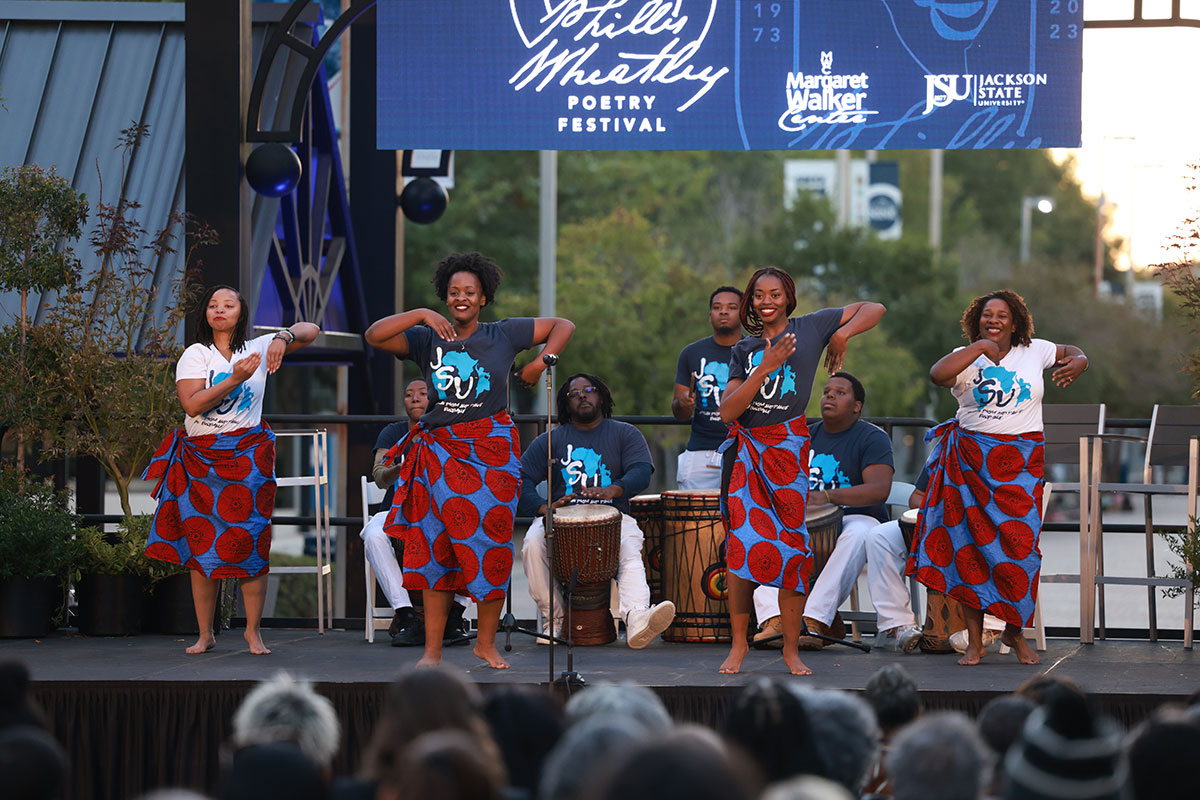
Women writers reconvened at Jackson State University in November for the 50th anniversary of the Phillis Wheatley Poetry Festival, a four-day symposium of panels, poetry readings, luncheons and other events. Ten of the seven living attendees from the 1973 festival—including Alice Walker, Sonia Sanchez, Paula Giddings and Charleyne Hunter-Gault—participated in intergenerational conversations with some of today’s writers like Angie Thomas, Nikole Hannah-Jones, Imani Perry and Jesmyn Ward.
“Phillis Wheatley was buried in an unmarked grave and at a very young age, younger than me. And to this day, historians sort of surmise where she might be, but we don’t know for sure. So the poem takes place in a kind of imagined world in which we know where her grave is,” Ewing added.
The poem “Proof” was one of two pieces in The 1619 Project that brought Nikole Hannah-Jones to tears. And in light of the festivities, Ewing performed the poem for the audience sitting and listening to the “From Africa to America” panel on Jackson State University’s Gibbs-Green Plaza.
“Among the Blacks is misery enough God knows, but no poetry. Religion indeed has produced a Phillis Wheatley, but it could not produce a poet. The compositions published under her name are below the dignity of criticism,” she begins citing a Thomas Jefferson quote:
“Dear Phillis,
Pretend I wrote this at your grave.
Pretend the grave is marked.
Pretend we know where it is.
Copp’s Hill say. I have been there
And you might be.
Foremother, your name is the boat that brought you.
Pretend I see it in a stone with a gruesome cherub
Children come with paper and charcoal to touch you
Pretend it drizzles and a man in a ugly, plastic poncho
Circles the mathers all but sniffing the air warily.
We don’t need to pretend for this part.
There is a plaque in the grass for increase and cotton and Samuel
Dead at 78. Final son,
Who was there on the day when they came looking for
Proof. Eighteen of them watched you and they signed to say
The poems specified in the following page were, as we verily believe,
Written by Phillis, a young Negro girl who was but a few years since
Brought an uncultivated barbarian from Africa.
And the abolitionists cheered at the blow to Kant.
The Negroes of Africa have by nature no feeling
That rises above the trifling and the enlightened ones
Bellowed against the strike against Hume.
No ingenious manufacturers among them.
No arts. No sciences.
Pretend I was there with you Phillis
When you asked in a letter to no one
How many I am’s to be a real human girl?
Which turn of phrase evidence is a righteous heart.
If I know of Avid, may I keep my children?
Pretend that on your grave there is a date and it is
So long before my heroes came along to call you a coon.
For the praises you sang of you captors, who took you on
Discount because they assumed you would die.
That it never ever hurt your feelings or pretend you did not love America.
Phillis, I would like to think that after you were released unto the world
When they jailed your husband for his debts
And you lay in a maid’s quarters at night,
A free and poor woman with your last living boy
That you thought of the metamorphoses
Making the sign of Arachni in the tangle of your fingers
And here after all, lay the proof.
The man in the plastic runs a
Thumb over stone.
The gray is slick and tough.
Phillis Wheatley, 31, had misery enough.”
‘A Different Set of Rules’
Phillis Wheatley is broadly recognized as the first African American woman and the third woman to publish a book of poems. She was born in Gambia, Africa, in 1753 before enslavers captured her and brought her to America in 1761. She was named after the slave ship that brought her over and sold to the Wheatley family in Boston, Mass.
The Wheatley family educated her, and within 16 months of her arrival, Phillis could read the Bible, Greek and Latin classics, and British literature. She also studied astronomy and geography. She began to write poetry in her early teens and published her first poem in 1767. But the poem that brought her notoriety was “An Elegiac Poem, on the Death of Celebrated Divine George Whitefield,” published in 1770.
With English Countess of Huntingdon’s financial support, Phillis went with the Wheatleys’ son to London to publish her first collection of poems, “Poem on Various Subjects, Religious and Moral,” in 1773. It was the first book that an enslaved Black woman had written in America. John Hancock and other Boston nobles wrote the foreword for the book, which included a portrait of Wheatley to prove that a Black woman had written the work.
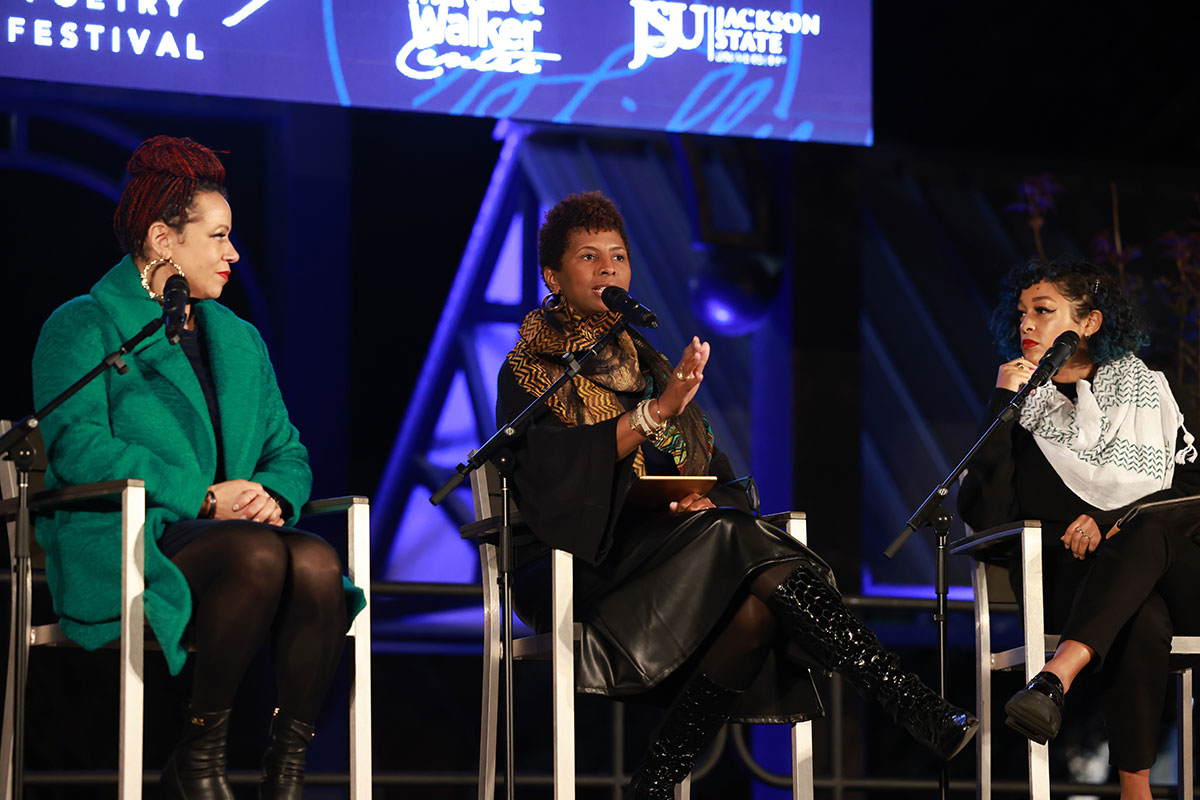
Her poetry reflected several influences on her life, including poets she had studied like Alexander Pope and Thomas Gray. She wrote about her African heritage and embraced the elegy writing style, likely from her African roots, whereupon the role of girls is to sing and perform funeral dirges.
Wheatley wrote about religion, which led Protestants in America and England to her work. Enslavers and abolitionists read her writings as well.
She supported the American Revolution but believed that slavery prevented colonists from achieving true heroism. In 1778, she married John Peters, a free Black man from Boston with whom she had three kids, though none of them survived infancy. Phillis tried to publish a second book of poems but failed. To help support her family, she worked as a maid in a boarding house, though she continued to write poetry. She grew ill and passed away on Dec. 5, 1784, at the age of 31.
Journalist Nikole Hannah-Jones learned of Wheatley as a historical figure before she knew her as a literary figure. Growing up in Waterloo, Iowa, she was not taught or exposed to Wheatley’s poetry, and what she remembered of the woman came through the lens of what white people thought Black people were and were not capable of, she explained.
“Phillis Wheatley was this woman who was born into slavery and who somehow surprised all these white folks because she was smart,” Hannah-Jones said. “And they didn’t believe her that she could actually have written the things that she could have written because they didn’t believe that African people were capable of that level of higher thinking, particularly literary thinking.”
This form of gatekeeping still shows up in society today, Hannah-Jones said, where at times it’s not until some esteemed white men write a book about things already being written that suddenly they become mainstream and legitimate.
“I know that the early attacks on ‘The 1619 Project,’ which came from very esteemed, older white men who were used to being the only ones who could frame how we thought about the American Revolutionary Period, was an attack that they hadn’t been invited into the project,” she said. “They literally said that ‘No one told us this was happening.’”
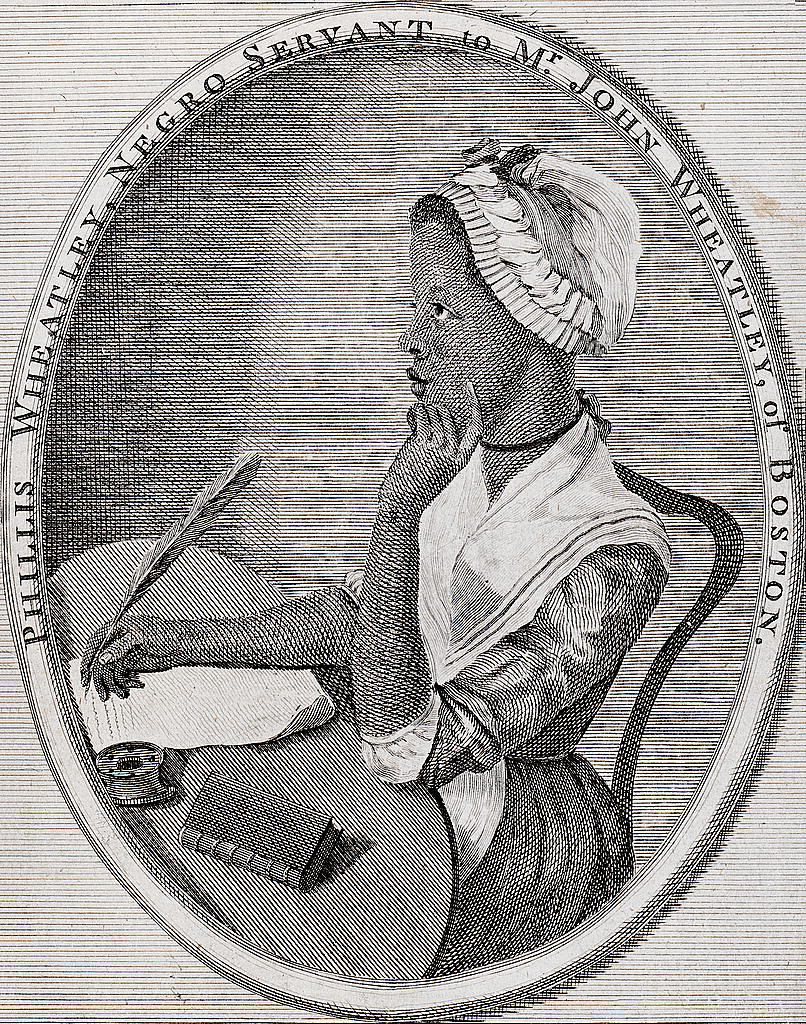
Eve Ewing said what frightens her about gatekeeping is not the visible gatekeeping, but the gatekeeping that happens in silence, that the people who are not in the room will never know about.
“I hear this all the time from young Black folks that have essentially been gaslit and that are asking themselves, ‘Why didn’t I get this invitation? Why wasn’t I at this conference?’ … And it’s because unbeknownst to you, folks behind the scenes are playing by a different set of rules,” Ewing said.
‘The Vision Costs’
Maryemma Graham goodnaturedly said that one doesn’t say no to Margaret Walker, whether she is alive or not. Her friendship with the prolific writer started when Walker was trying to recruit her to join Jackson State University’s Institute for the Study of the History, Life and Culture of Black People.
Graham would go on to write a biography of Walker’s life “The House Where My Soul Lives: The Life of Margaret Walker,” which was released on Dec. 2, 2022. She says that the institute was the thing that Walker envisioned when writing was not enough. Walker needed a mission to accomplish what she saw as her life’s work, Graham described.
“That work was transforming higher education. It was doing what we call public engagement. Bringing communities together and that knowledge, learning, producing it and sharing it were essential functions of higher education,” the biographer said.
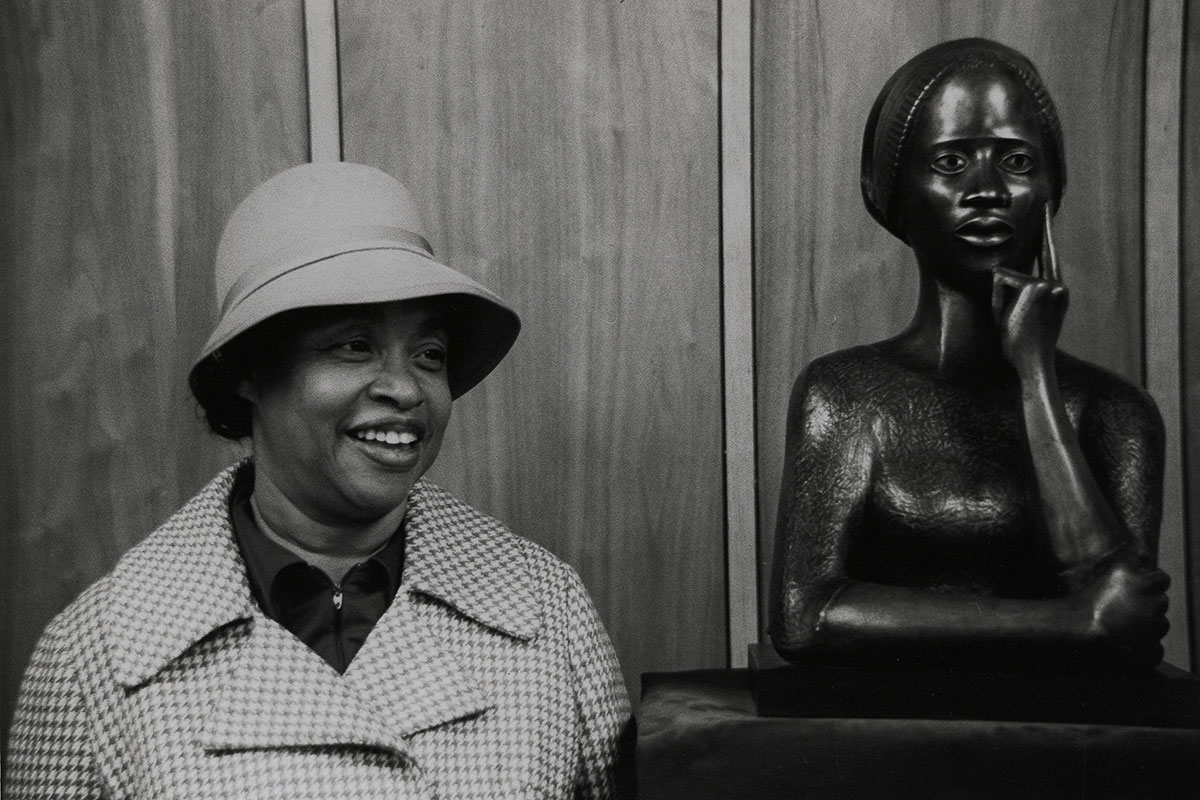
Margaret Walker loved Mississippi, Graham said, and settled her roots here. She wanted to show Mississippi in a different light to the world because many looked at Mississippi as the drudge of the world, even today.
Poet and novelist Margaret Walker was born on July 7, 1914, in Birmingham, Ala. Her family moved to New Orleans, La., when she was a young child. Walker’s father was a scholar who passed on his love of literature to Margaret while her mother played ragtime and read poetry to her. At the age of 11, she began reading Langston Hughes and Countee Cullen.
After graduating from Northwestern University, Walker published her first poem “Crisis” in 1934. Two years later, she joined the Federal Writers’ Project in Chicago, where she became friends with Richard Wright and joined his South Side Writers Group. Her first collection of poetry, “For My People,” published in 1942, won the Yale Series of Younger Poets Award, making Walker the first Black woman to receive the award.
Walker married Firnist Alexander in 1943, and they had four children together. In 1949, the family moved to Jackson, Miss., where she joined the faculty at Jackson State University. She returned to the University of Iowa for her doctoral studies and received her doctorate in 1965. The next year, she published her dissertation as a novel, “Jubilee,” which was based on the life of her great-grandmother.
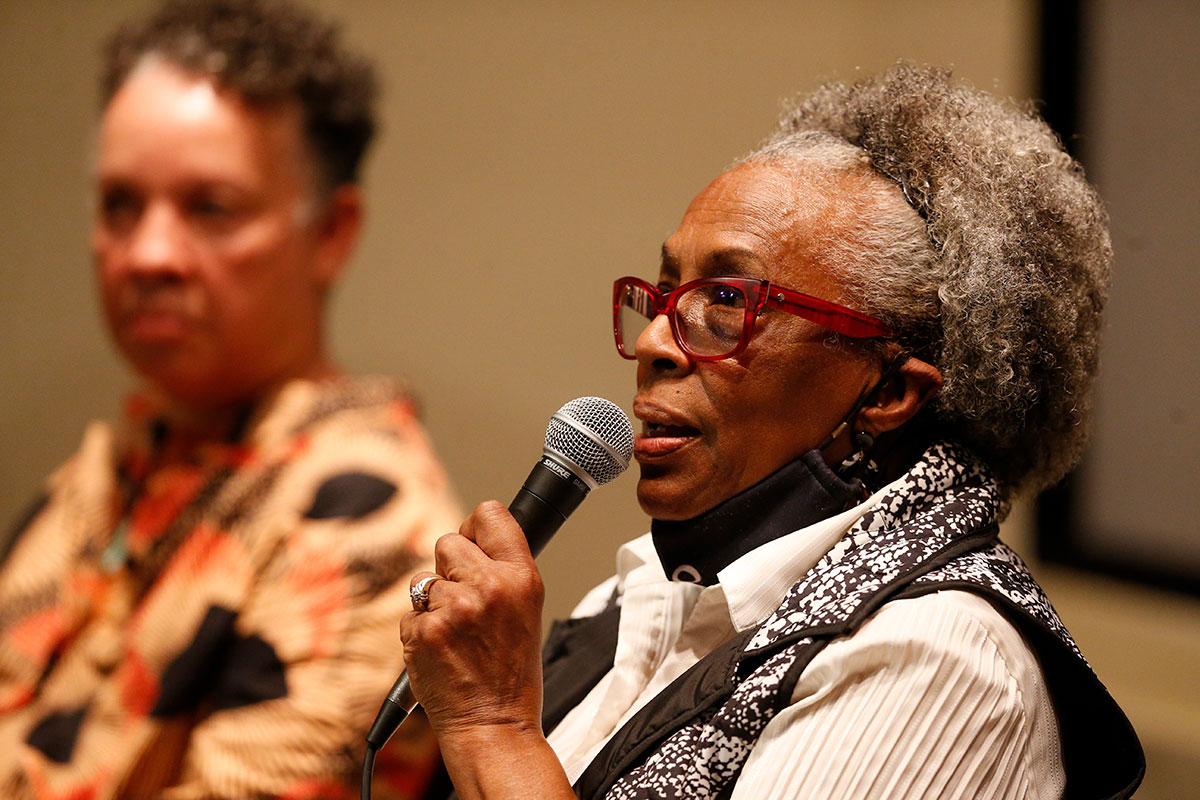
In 1968, she founded the Institute for the Study of the History, Life and Culture of Black People at Jackson State College. As a director of the institute, she organized the 1971 National Evaluative Conference on Black Studies and the 1973 Phillis Wheatley Poetry Festival. The conference was held on the bicentennial of Phillis Wheatley’s “Poems on Various Subjects, Religious and Moral.” Thirty women participated in a series of lectures, roundtable discussions, poetry readings and other events on campus.
“That festival was not her first event, so Walker had already known that when you commit to something like this, you got to have funding,” Graham said. “So she had NEH funding, (and) she applied for it. The 1971 Evaluative Conference, that was funded, and part of that proposal would set the trend for what she would be doing in the future.”
Walker sought funding from the Mississippi Committee for the Humanities, the Ford Foundation and others who provided public and private funding. She was a very persuasive and convincing person, recognizing that when you have a vision, the vision costs, Graham described.
“She was the person who picked up the phone and called people, so what you got in that letter was a typical ploy that Walker used. Pick up the phone and call, ‘I need somebody.’ At least you got a letter,” Graham told Shelly Lowe, who mentioned the 1973 letter Walker sent to NEH to help fund the poetry festival.
After Margaret Walker retired from teaching in 1979, she published “On Being Female, Black and Free,” a collection of personal essays, and “Richard Wright: Daemonic Genius,” a nonfiction piece based on her friendship with Wright. She died of cancer on Nov. 30, 1988, in Jackson, Miss.
‘Artists Translate Humanities’
National Endowment for the Arts Chair Maria Rosario-Jackson has always thought that without artists, scholars and people in the arts and humanities, none of the things that we aspire to as a nation of opportunity are possible or durable.
“The role of funding for the arts isn’t only about the arts and the arts sector. It’s about our trajectory as a people, as a community, as a nation, as a world,” Rosario-Jackson said at the Margaret Walker panel inside Jackson State’s Student Center. “To understand how to support in a way that creates an environment where all people can have artful lives is something that I really believe in.”
Learning more about Margaret Walker’s work makes her think about what NEA can do to invest in that work and how they can show up as a national resource. National Endowment for the Humanities Chair Shelly Lowe was also on the panel, and she said she believed that artists translate humanities for us in ways we can see, smell, taste and hear.
“NEH, I hope, is an entity that ensures that when we want to answer questions like the what, the who, the where and the when, NEH has made sure that the materials to answer those questions are available … but even more that NEH can help you answer the how and the why,” Lowe told the audience.
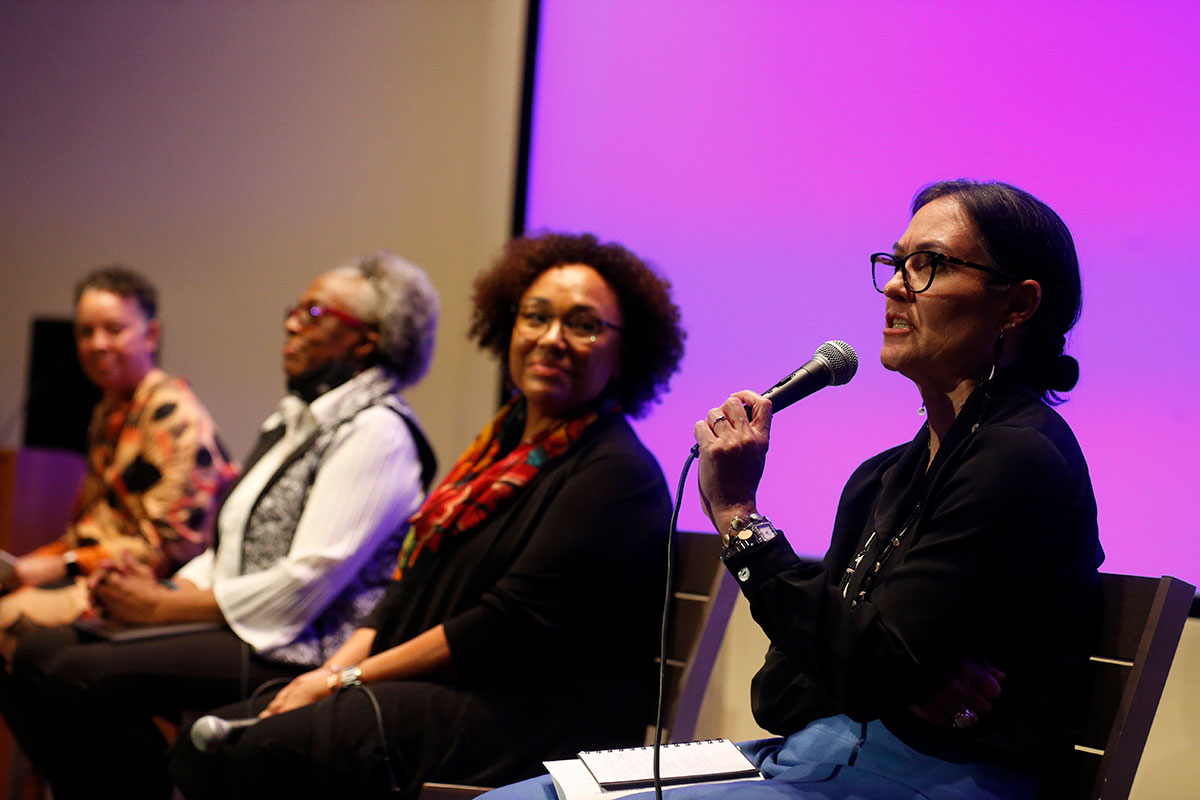
With recent book bans and funding being pulled from arts education, Lowe believes it’s up to NEH and other funders to invite the young people to the table because they have so much to say but do not often get asked about their opinions.
“Yesterday at the luncheon, we walked in, and I saw a table full of almost all young people. And I saw another table full of all young people, and I was like, ‘Look at this!’ It was so exciting because that doesn’t happen very often,” the NEH chair said.
While Rosario-Jackson agreed that younger generations should be involved in conversations about these topics, she also believes that we should focus on investing more into arts education because it’s critical.
“Something that we try to do through our arts-education program is ensure that all kids have access to an excellent arts education that represents them and helps them see their value and their humanity,” Rosario-Jackson added.
‘Journey to the Horizon’
After graduating from Atlanta’s Henry McNeal Turner High School in 1960, Charlayne Hunter and Hamilton Holmes integrated the University of Georgia, a white institution, just five years after Brown v. Board of Education. While attending undergrad, she also enrolled in journalism courses at Wayne State University in Detroit, Mich.
She began reporting on the Civil Rights Movement, keeping her eye on the Atlanta Student Movement that was rising up. She joined the Red and Black, the college’s newspaper, but she never got any assignments, so she devised a different plan.
Every weekend, she went to Atlanta, dropped her belongings off at her mother’s house and headed over to M. Carl Holman’s house. In the basement, Holman and Julian Bond were putting out the Atlanta Inquirer, as they could not cover movement news with the Atlanta Daily World due to its white advertisers.
“The students would get arrested demonstrating,” Hunter-Gault told the audience at the “Our People” panel inside the Jackson Convention Center complex theater on Nov. 3. “They wanted to get arrested so that they could make cases in court to challenge ‘separate and unequal.’ They would get bailed out and come to Carl’s basement and tell their stories, and I would write them down.”
“But there came a time where I got tired of sitting in the basement,” she added. “I said, ‘I want to get out into the streets.’”
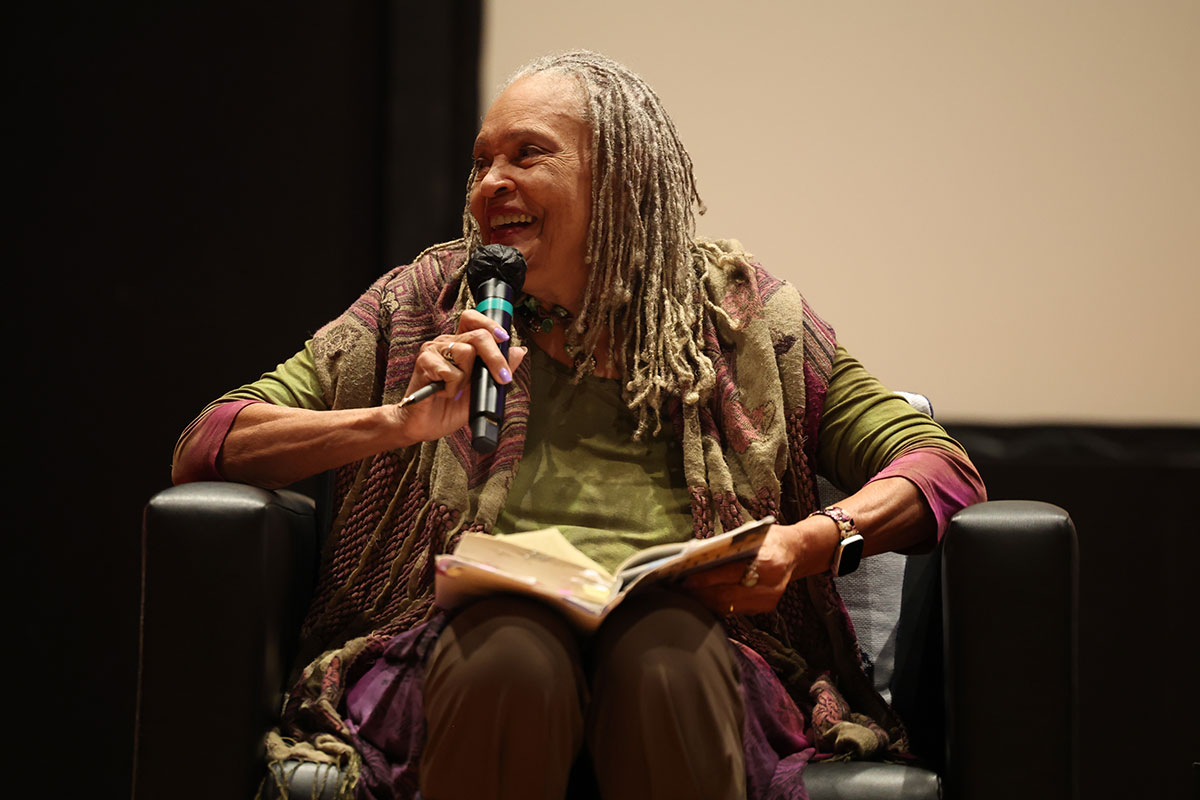
She started going around the city and recording things that were motivating students to demonstrate. One night, at Grady Hospital, she watched a white doctor stick a scalpel in a Black man’s head, watching the knife go all the way through to the other side.
“That was a challenge for a young would-be journalist to write about because I was practically in tears,” the award-winning journalist said. “But I think that’s okay for us to have personal feelings even as journalists. But we have to remain true to the profession of writing who, what, when, where and how.”
“Then, there weren’t many places where you could really interpret what was going on, and thankfully, Carl and Julian enabled me to start my journey to the horizon,” she continued.
‘Everyone Resisted’
Journalism inspired award-winning author Jesmyn Ward’s new book “Let Us Descend,” which follows an enslaved young woman in the 1800s. Eight years ago, she was listening to an NPR episode about New Orleans history, specifically about the slave pens and markets of New Orleans.
“One of the things that the historian said was that out of the dozens and dozens of slave pens that existed in the city of New Orleans, there were only two markers where slave pens were, and one of them was in the wrong location,” Ward told the audience.
“I started to tear up right when I heard that because I felt like all the enslaved people who had been sent to the slave markets and gone through slave pens, who had endured so much and fought and resisted and did their best to survive that experience, all that had been erased from the landscape. And it felt very wrong,” she said.
The idea for Annis, the main character in her new book, popped into her head. She read and researched American slavery for two and a half years before she began working on the novel. In her research, she was relieved upon learning that nobody just accepted enslavement, that everyone resisted.
“I’m grateful that the research for this book taught me that. I think it helped me to see and to understand our ancestors better, and I think it also helped me to understand our legacy of resistance better and all the things that we do today to resist and to push back,” the Gulf Coast native said.
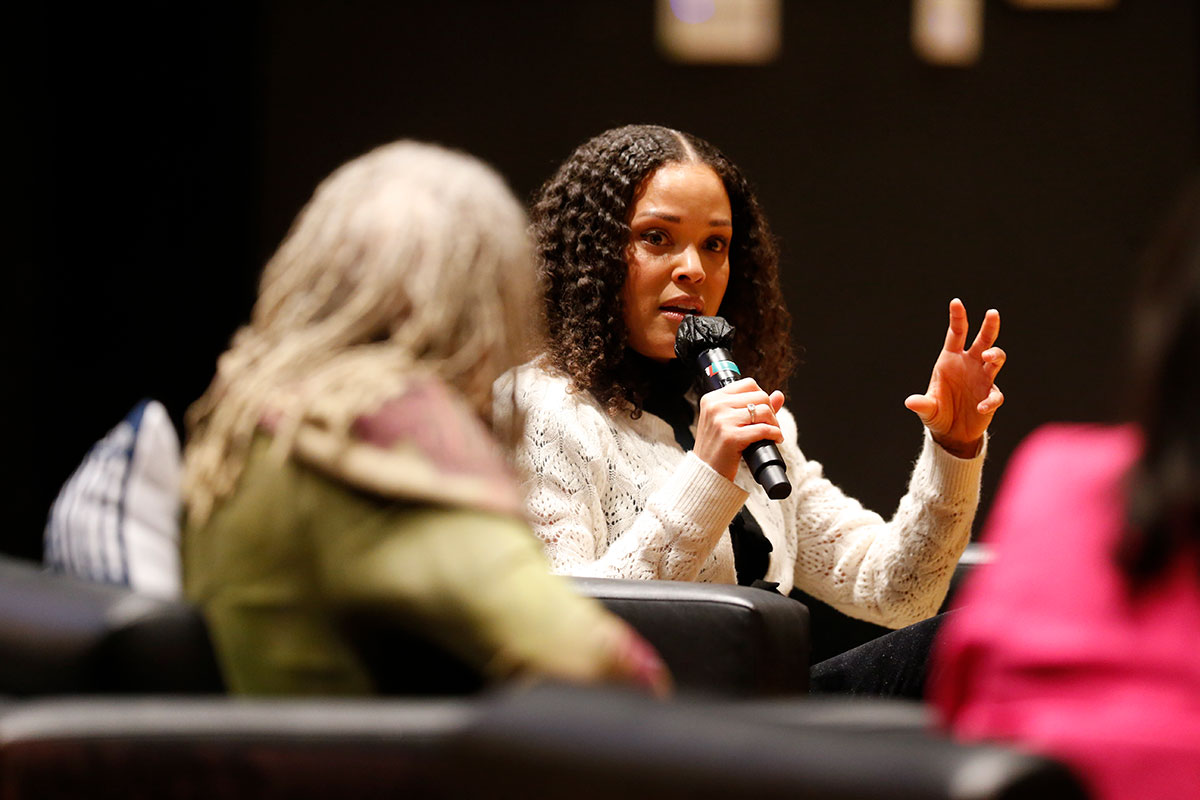
\When asked about the value of intergenerational discourse, Ward attested to its importance because without her literary interactions with authors like Toni Morrison or Alice Walker, she would not be where she is today. She may not have met them, but reading their works felt like a hand was reaching across space and time to reach her.
“I think there is real value in forging those networks and have community in spaces like this, where we can come together and we can learn from each other,” Ward said. “We can find inspiration in each other because this is an endless fight.”
Charlayne Hunter-Gault, 81, pointed to Jesmyn Ward, 46, as a prime example of the need for a coalition of the generations because everyone has a lot that could be learned from one another. “I think my generation still has something to offer, but we need young people like this because she is continuing to carry on the struggle that has helped us get thus far on our way,” Hunter-Gault said.

